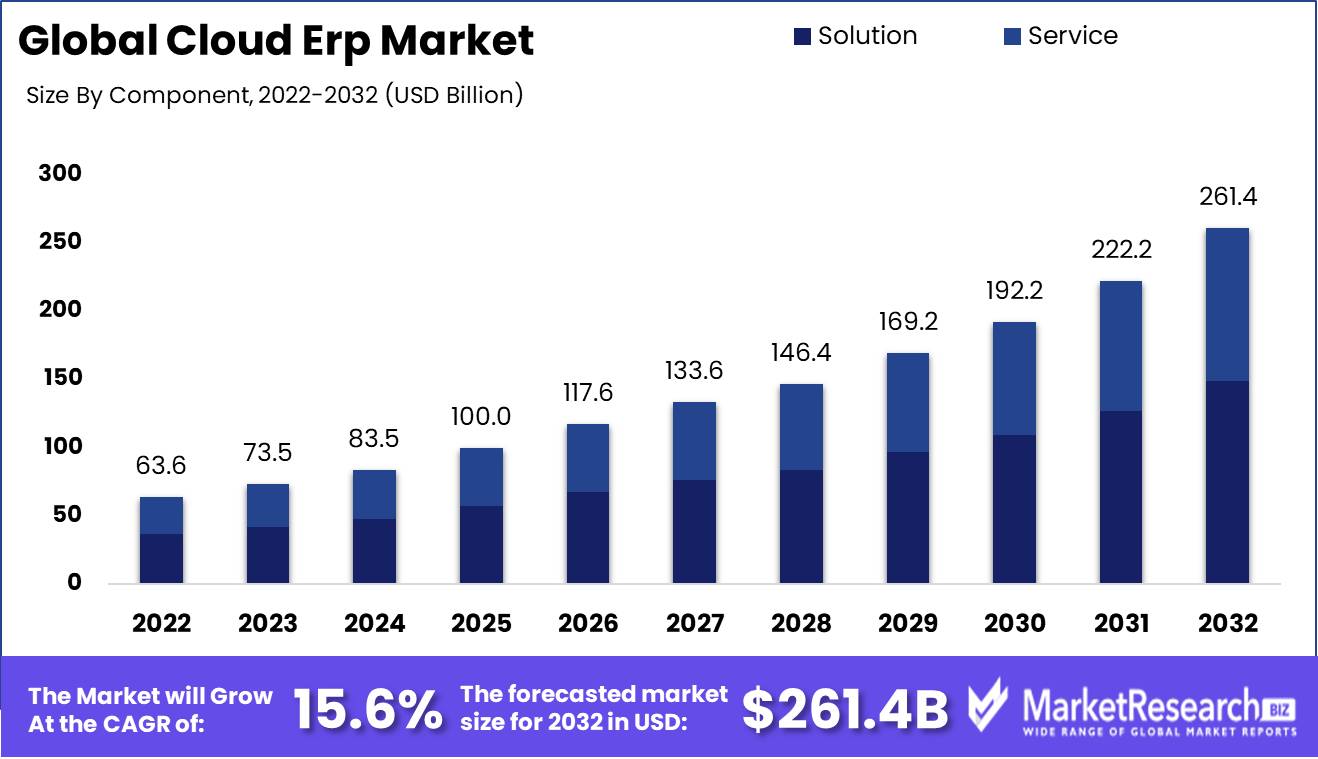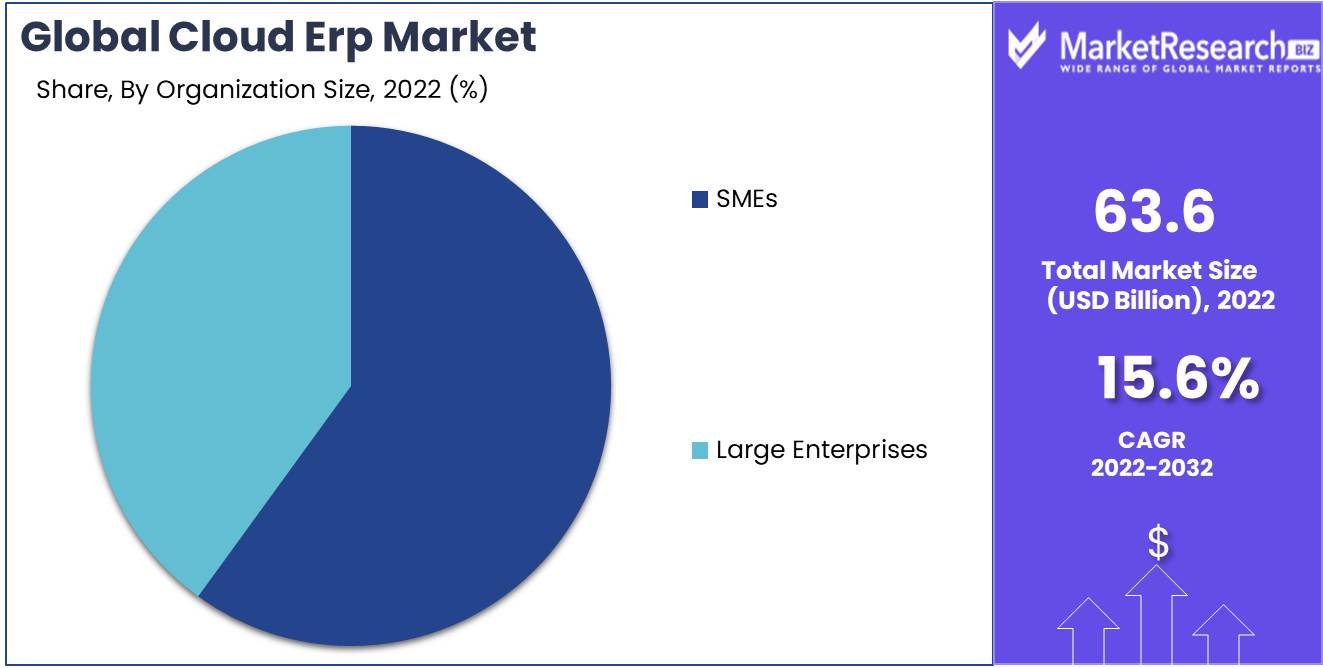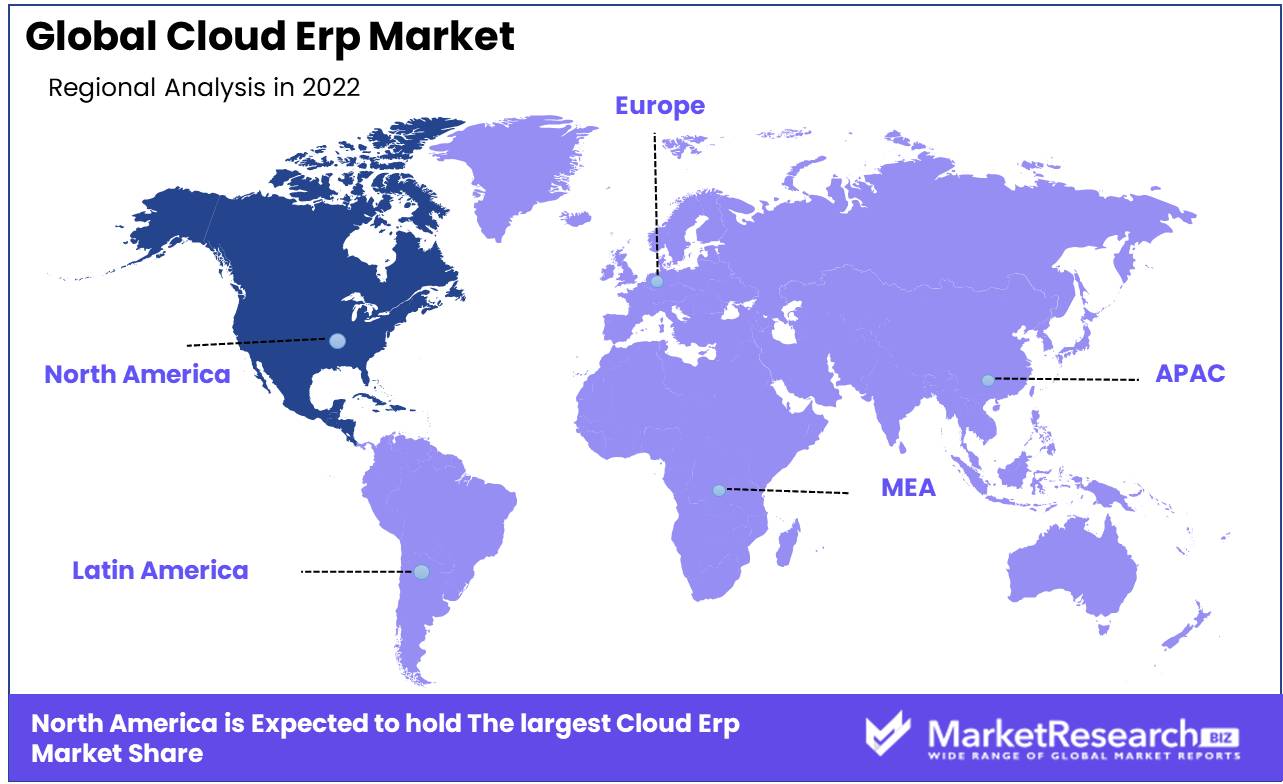
Cloud Erp Market By Component (Solution, Service), By Organization Size (SMEs, Large Enterprises), By Industry Vertical (BFSI, IT & Telecommunication, Government Sector, Healthcare, Other), By Region And Companies - Industry Segment Outlook, Market Assessment, Competition Scenario, Trends, And Forecast 2023-2032
-
39772
-
July 2023
-
179
-
-
This report was compiled by Vishwa Gaul Vishwa is an experienced market research and consulting professional with over 8 years of expertise in the ICT industry, contributing to over 700 reports across telecommunications, software, hardware, and digital solutions. Correspondence Team Lead- ICT Linkedin | Detailed Market research Methodology Our methodology involves a mix of primary research, including interviews with leading mental health experts, and secondary research from reputable medical journals and databases. View Detailed Methodology Page
-
Quick Navigation
Report Overview
Cloud Erp Market size is expected to be worth around USD 261.4 Bn by 2032 from USD 63.6 Bn in 2022, growing at a CAGR of 15.60% during the forecast period from 2023 to 2032.
The Cloud Erp Market as we plunge into cutting-edge technologies. Erp software and cloud computing gracefully coexist in this intriguing world. The capacity to use the Internet as a means of communication is a key component of the business model. Integrating and improving many business processes, from financial orchestration and inventory control to human capital management, client rapport development, and supply chain management.

Cloud Erp innovation is constant. AI and machine learning have improved predictive foresight, intelligent automation, and data-informed decision-making in cloud Erp systems. Encryption and multi-factor authentication protect sensitive business data.
The cloud Erp market has received significant financial investments, demonstrating its growing importance in business. Oracle, SAP, and Microsoft have invested heavily in cloud Erp development. Classic Erp manufacturers have also evolved to offer cloud-based solutions in response to market demand.
Cloud Erp market adoption is accelerated by numerous factors. Its cost-efficiency by eliminating upfront IT infrastructure and maintenance expenses is a major driver. In today's linked environment, cloud-based solutions are increasingly needed for remote work and collaboration. Finally, cloud Erp gives businesses real-time data access and analytics to make swift, informed decisions.
The Cloud Erp market, like any modern technology, has ethical problems with transparency, explainability, and responsibility. The number of times a year that a person's name is on a list or in a book is the same as the number of times a person's name is on a list. Explainability makes cloud Erp systems' AI-driven judgments understandable, while accountability underlines firms' data privacy and compliance obligations.
Driving factors
Cloud Computing Growth
Cloud computing has altered business. The adoption of cloud computing has become a driving force in the business environment as organizations seek creative and cost-effective solutions to improve their operational efficiency. The ability to store and access data in the cloud, as well as the ability to use the Internet of Things (IoT) for business purposes, is a feature of the cloud computing industry. Having said the same, it's important to note that the majority of these organizations are based in the United States. Companies can save a lot of money by switching to cloud-based Erp systems because they don't need to buy expensive hardware or software anymore.
Business Solutions Needed
In today's fast-paced business climate, organizations need integrated, scalable solutions to streamline operations and improve productivity. Cloud-based Erp systems are a reliable solution. These systems consolidate business processes including finance, HR, inventories, and CRM. The following is a list of the many ways that the Internet of Things (IoT) may be used to improve your business. This integration removes data silos and improves real-time decision-making information accuracy and availability. Harness innovation in the Cloud ERP Market, unlocking efficiency and agility through advanced Cloud Infrastructure Services integration.
Flexibility and Savings Cloud Erp Systems
On-premise Erp systems require significant hardware, software licenses, and IT staffing. Cloud Erp systems save upfront expenditures and give firms predictable monthly prices. Since the service provider maintains and upgrades systems, organizations may focus on essential business activities and free up IT staff. Cloud Erp may be accessible anywhere with an internet connection, providing unmatched flexibility. Remote access lets employees collaborate across time zones and locations, boosting productivity. The usage of a smartphone or tablet to access the Internet of Things (IoT) is a common feature of the cloud.
Real-time Data and Analytics Demanding
Today's data-driven world requires rapid, precise information for business choices. Cloud Erp systems give organizations real-time data and analytics to improve operations. These systems let firms track KPIs, spot trends, and spot bottlenecks in real time. With the ability to aggregate and analyze massive amounts of data, companies may streamline operations, optimize resource allocation, and identify growth prospects.
SME Cloud Erp Market Growth
SMEs drive global economic growth. SMEs are using cloud Erp systems to maximize their potential due to their cost and availability. Cloud Erp gives SMEs enterprise-grade features and functionalities without large upfront costs. Cloud Erp systems streamline operations, improve productivity, and improve cooperation, allowing SMEs to compete with larger organizations. These systems let SMEs automate tedious procedures, integrate departments, and obtain real-time business visibility.
Restraining Factors
Cloud Erp Advantages, Disadvantages
In order to improve the efficiency of their operations, organizations are increasingly turning to the Internet. In recent years, there has been a surge in interest in the use of cloud computing, which has led to the development of several new technologies. Despite the increased demand for cloud Erp solutions, organizations must consider numerous restricting considerations before switching.
Cloud Erp Adoption Security Issues
Storing sensitive corporate data on third-party servers can cause concern. Cloud Erp suppliers take security seriously and follow industry standards, yet data breaches and illegal access are still possible. Concerns about data sovereignty, compliance, and mobility also contribute to cloud Erp solutions' reluctance.
Secure Cloud Erp Data
It's important to note that many respectable cloud Erp vendors invest heavily in infrastructure security and security processes. Encryption, access limits, and security audits protect data. Organizations can reduce these concerns and maximize the benefits of cloud-based solutions by selecting a trustworthy and dependable cloud Erp supplier.
Cloud Erp Migration Issues
The complexity of migration and integration processes is another restraint on the Cloud Erp market. Legacy Erp systems can make cloud data migration difficult for companies. Map and alter data structures, redefine business processes, and train users on the new system. Avoiding company disruptions requires careful planning and execution of these projects.
Cloud Erp Integration Issues
Integrating cloud Erp systems with other software might also be difficult. Incompatibility, data synchronization, and bespoke integration solutions might contribute to complexity and delays. It is crucial to note that many cloud Erp vendors offer extensive migration and integration services, providing a smooth transition and successful integration of the new system with the existing IT infrastructure.
Component Analysis
The solution segment dominates cloud Erp, a fast-growing market. Emerging economies are fueling solution segment adoption. The need for a better way to manage one's finances is highlighted by the fact that the majority of the world's economies are based on the sale of goods and services.
Consumers' solution segment behavior is intriguing. Businesses are recognizing the benefits of cloud Erp, including cost savings, scalability, and ease of connection. The use of a cloud-based system to store and process data is becoming more and more common.
Organization Size Analysis
SMEs dominate cloud Erp. SMEs are realizing the value of cloud Erp for business process management. Emerging economies' economic growth has driven SMEs' cloud Erp adoption.SMEs are realizing the benefits of cloud Erp solutions. The use of these tools to improve the quality of life for all involved is encouraged. Cloud Erp gives SMEs the scalability and flexibility they need to adapt to a fast-changing market.
Consumer behavior toward the SMEs segment is also notable. Cloud Erp helps SMEs compete with bigger companies. They realize cloud Erp gives them the same capabilities and functionalities as larger organizations. This tendency is driving SME's segment growth in the Cloud Erp market.
The fastest-growing segment of the economy, the SMEs, are the fastest-growing segment of the economy. SMEs are growing globally, especially in emerging economies. As the number of SMEs grows, the need for their services will rise. The same goes for the SMEs that are being served by the cloud. This focus on SMEs will enhance Cloud Erp market growth for this segment.

Industry Vertical Analysis
BFSI dominates cloud Erp. The banking, financial services, and insurance (BFSI) industry relies on efficient and secure data and process management. Cloud Erp solutions meet these needs, making them popular in BFSI.
As emerging economies flourish, BFSI is adopting cloud Erp. These economies need efficient and scalable financial services solutions to handle the enormous volume of data and transactions. Cloud Erp is a trustworthy BFSI operations management solution.
Consumer behavior shows the BFSI segment's market importance. In order to improve the quality of life for their customers, businesses in the BFSI industry should adopt a more proactive approach. The ability to connect a variety of financial services into a single, integrated system is a key selling point for the company.
Key Market Segments
By Component
- Solution
- Service
By Organization Size
- SMEs
- Large Enterprises
By Industry Vertical
- BFSI
- IT & Telecommunication
- Government Sector
- Healthcare
- Retail & Consumer Goods
- Energy and Utilities
- Other Industry Verticals
Growth Opportunity
Emerging Market Expansion Unlocking Potential
As cloud Erp solutions gain popularity, emerging markets have huge untapped potential. It's possible to find a new home for your firm as a result of this. With the help of a few simple tricks, you can make the most of your time and money. The ability to accommodate distinct localization needs, cultural subtleties, and regulatory restrictions can propel Cloud Erp market growth in these locations.
Industry-Specific Cloud Erp Solutions for Diverse Needs
While basic Erp systems serve a wide range of businesses, adapting solutions to specific industries can boost efficiency and give a competitive edge. The term "cloud" refers to a type of computing device that stores and transmits data. The best way to get the word out about your business is to use the internet.
Emerging Technology Integration Smart Decision-Making
AI and IoT integration with cloud Erp solutions offers tremendous growth. AI and advanced analytics provide smarter, faster decision-making by providing actionable insights, predictive analysis, and automation. With the help of a few simple tricks, you may turn your business into a success. The use of IoT devices to collect data on the Internet of Things (IoT) is a common practice in the United States, but it is also a common practice in the United Kingdom.
Cloud Platform Provider Collaboration Leveraging Synergies
Collaborations with prominent cloud platform providers are another opportunity for growth in the Cloud Erp market. The ability to use the Internet of Things (IoT) to communicate with others is a key component of the Internet of Things (IoT) ecosystem. Cloud Erp providers may attract more customers by easily connecting their solutions with popular cloud platforms to boost reliability, data management, and performance. Businesses may use cloud-native technology and economies of scale to deploy cloud Erp solutions more quickly thanks to our collaboration.
User-Friendly Interfaces and Mobile Access Improve User Experience
Cloud Erp providers may enhance user experience and promote user adoption by promoting intuitive and visually appealing interfaces. Mobile Erp system access allows users to make real-time decisions and boost productivity. The availability of mobile apps built specifically for multiple operating systems and screen sizes can boost user satisfaction, fostering Cloud Erp market growth.
Latest Trends
Hybrid Cloud Erp Solutions Rise
Hybrid cloud Erp solutions are a major trend. Hybrid cloud Erp is flexible and scalable, combining the advantages of on-premises and cloud solutions. Businesses can keep sensitive data on-premises while harnessing cloud power for other processes. Organizations can optimize their IT infrastructure, decrease expenses, and improve data security by implementing a hybrid cloud Erp strategy.
Erp Modularity and Scalability
Traditional Erp systems were monolithic, making customization difficult. Modern cloud Erp solutions are modular, allowing businesses to choose and integrate only the modules they require. This flexible strategy lets organizations adjust their Erp system to their needs, enhancing productivity and reducing bloat.
Analytics and BI
Data analytics and business intelligence have become more important in the Cloud Erp market as businesses realize the potential of data. Advanced analytics in modern cloud Erp solutions enable organizations to acquire meaningful insights from massive data sets. Businesses may make better decisions, discover trends, optimize processes, and find hidden opportunities by harnessing the power of data analytics. Forward-thinking organizations focus on data-driven decision-making.
Predictive and AI-Driven Automation
AI is automating and predicting the Cloud Erp market. AI-powered systems can evaluate large datasets, forecast outcomes, automate repetitive processes, and make personalized recommendations. This revolutionary technology streamlines business processes, boosts productivity, and frees up resources for strategic initiatives. AI integration with cloud Erp solutions will touch many industries as it evolves.
Cloud-Based Business Applications
Finally, Cloud Erp market trends include integration with other cloud-based business software. Organizations use CRM, HR, supply chain, and e-commerce software solutions. End-to-end process automation and data synchronization require seamless cloud Erp application integration. Businesses may streamline their processes, eliminate data silos, and increase company productivity with integrated cloud Erp.
Regional Analysis
North America dominates cloud, Erp. Today's commercial world is moving toward cloud-based solutions. Cloud Erp systems provide businesses with unmatched flexibility, scalability, and efficiency. North America dominates the Cloud Erp market as companies optimize and streamline operations.
North America pioneered cloud-based solutions. The presence of multiple tech giants, as well as the presence of countless startups, has led to the development of a robust market for cloud-based Erp systems. The rise of the Internet of Things (IoT) in North America is a direct result of the rapid growth of the Internet of Things (IoT) market.
North America dominates due to businesses of all sizes demanding superior Erp solutions. The benefits of using a cloud-based system to store and access data are well-documented. The demand for these services has increased and now is the time to take advantage of this opportunity.
North America also has cloud-savvy workers. Businesses may utilize the potential of Cloud Erp systems because of the region's technological proficiency coupled with high levels of digital literacy. The United States of America's largest city, Chicago, has a long history of producing world-class athletes.
Government actions and supportive regulations boost the North American Cloud Erp market. The United States government has established a program to encourage the use of cloud computing in its education system. This inclusion and regulatory support encourage businesses to invest in cloud Erp systems.

Key Regions and Countries
North America
- US
- Canada
- Mexico
Western Europe
- Germany
- France
- The UK
- Spain
- Italy
- Portugal
- Ireland
- Austria
- Switzerland
- Benelux
- Nordic
- Rest of Western Europe
Eastern Europe
- Russia
- Poland
- The Czech Republic
- Greece
- Rest of Eastern Europe
APAC
- China
- Japan
- South Korea
- India
- Australia & New Zealand
- Indonesia
- Malaysia
- Philippines
- Singapore
- Thailand
- Vietnam
- Rest of APAC
Latin America
- Brazil
- Colombia
- Chile
- Argentina
- Costa Rica
- Rest of Latin America
Middle East & Africa
- Algeria
- Egypt
- Israel
- Kuwait
- Nigeria
- Saudi Arabia
- South Africa
- Turkey
- United Arab Emirates
- Rest of MEA
Key Players Analysis
Oracle Corporation leads the Cloud Erp market with its diverse enterprise solutions. Their strong Erp applications incorporate finance, supply chain management, HR, and CRM. Oracle's cloud Erp solutions give businesses real-time visibility, cognitive analytics, and automation to streamline operations, improve decision-making, and expand.
Microsoft Corporation, known for its software, offers a complete cloud Erp solution through its Dynamics 365 package. Microsoft's Erp applications, built on Azure, help organizations optimize financial management, supply chain operations, manufacturing, and more. The use of Microsoft Office 365, Power BI, and other third-party software allows for seamless integration into the workplace.
SAP, a prominent enterprise software company, offers intelligent cloud Erp solutions using AI, ML, and predictive analytics. The best way to get your business done is to use the services of a company like SAP. Innovative technology helps businesses improve efficiency, innovate, and compete in today's dynamic market.
Global enterprise software company IFS provides industry-specific cloud Erp solutions. IFS helps businesses optimize operations, reduce costs, and improve customer satisfaction with industry-specific features like manufacturing, supply chain management, and service management. IFS's powerful Erp capabilities enable digital transformation, agility, and resilience for organizations.
Cloud Erp solutions from Infor serve manufacturing, healthcare, retail, and hospitality. Infor enables organizations to improve visibility, collaboration, and operational excellence with a focus on delivering integrated business processes. Their Erp applications use industry best practices and powerful analytics to help businesses make data-driven decisions and develop.
Top Key Players in Cloud Erp Market
- Oracle (U.S.)
- Microsoft (U.S.)
- SAP (Germany)
- IFS (Sweden)
- Infor. (U.S.)
- Sage Group plc (U.K.)
- Workday, Inc. (U.S.)
- Plex (U.S.)
- Ramco Systems. (India)
- Epicor Software Corporation (U.S.)
- Tally Solutions Private Limited (India)
- Odoo (U.S.)
- SYSPRO (South Africa)
- Tyler Technologies (U.S.)
- MIE Solutions (U.S.)
- Genius Solution, Inc. (U.S.)
- Deltek, Inc. (U.S.)
- QAD Inc. (U.S.)
- VIENNA Advantage (Germany)
- Acumatica, Inc. (U.S.)
Recent Development
- In 2023, SAP debuted its breakthrough SAP S/4HANA Cloud employing its Erp software.
- In 2022, With the launch of Oracle Cloud Erp Oracle made a major stride. Oracle's new solution helps organizations streamline operations, enhance resource allocation, and increase efficiency by building on its Erp software.
- In 2021, Microsoft released its cloud-based Erp software, Microsoft Dynamics 365 Business Central.
- In 2020, Market leader Infor launched Infor CloudSuite Erp. Infor empowers organizations with its extensive cloud-based solutions.
- In 2019, Sage Intacct Cloud Erp made waves. Sage Intacct Cloud Erp's cloud-native architecture and Sage's experience give organizations exceptional financial capabilities, automation, and real-time insights.
Report Scope
Report Features Description Market Value (2022) USD 63.6 Bn Forecast Revenue (2032) USD 261.4 Bn CAGR (2023-2032) 15.60% Base Year for Estimation 2022 Historic Period 2016-2022 Forecast Period 2023-2032 Report Coverage Revenue Forecast, Market Dynamics, COVID-19 Impact, Competitive Landscape, Recent Developments Segments Covered By Component (Solution, Service), By Organization Size (SMEs, Large Enterprises), By Industry Vertical (BFSI, IT & Telecommunication, Government Sector, Healthcare, Retail & Consumer Goods, Energy and Utilities, Other Industry Verticals) Regional Analysis North America – The US, Canada, & Mexico; Western Europe – Germany, France, The UK, Spain, Italy, Portugal, Ireland, Austria, Switzerland, Benelux, Nordic, & Rest of Western Europe; Eastern Europe – Russia, Poland, The Czech Republic, Greece, & Rest of Eastern Europe; APAC – China, Japan, South Korea, India, Australia & New Zealand, Indonesia, Malaysia, Philippines, Singapore, Thailand, Vietnam, & Rest of APAC; Latin America – Brazil, Colombia, Chile, Argentina, Costa Rica, & Rest of Latin America; Middle East & Africa – Algeria, Egypt, Israel, Kuwait, Nigeria, Saudi Arabia, South Africa, Turkey, United Arab Emirates, & Rest of MEA Competitive Landscape Oracle (U.S.), Microsoft (U.S.), SAP (Germany), IFS (Sweden), Infor. (U.S.), Sage Group plc (U.K.), Workday, Inc. (U.S.), Plex (U.S.), Ramco Systems. (India), Epicor Software Corporation (U.S.), Tally Solutions Private Limited (India), Odoo (U.S.), SYSPRO (South Africa), Tyler Technologies (U.S.), MIE Solutions (U.S.), Genius Solution, Inc. (U.S.), Deltek, Inc. (U.S.), QAD Inc. (U.S.), VIENNA Advantage (Germany), Acumatica, Inc. (U.S.) Customization Scope Customization for segments, region/country-level will be provided. Moreover, additional customization can be done based on the requirements. Purchase Options We have three licenses to opt for: Single User License, Multi-User License (Up to 5 Users), Corporate Use License (Unlimited User and Printable PDF) -
-
- Oracle (U.S.)
- Microsoft (U.S.)
- SAP (Germany)
- IFS (Sweden)
- Infor. (U.S.)
- Sage Group plc (U.K.)
- Workday, Inc. (U.S.)
- Plex (U.S.)
- Ramco Systems. (India)
- Epicor Software Corporation (U.S.)
- Tally Solutions Private Limited (India)
- Odoo (U.S.)
- SYSPRO (South Africa)
- Tyler Technologies (U.S.)
- MIE Solutions (U.S.)
- Genius Solution, Inc. (U.S.)
- Deltek, Inc. (U.S.)
- QAD Inc. (U.S.)
- VIENNA Advantage (Germany)
- Acumatica, Inc. (U.S.)




